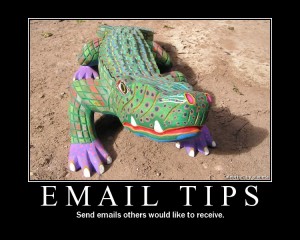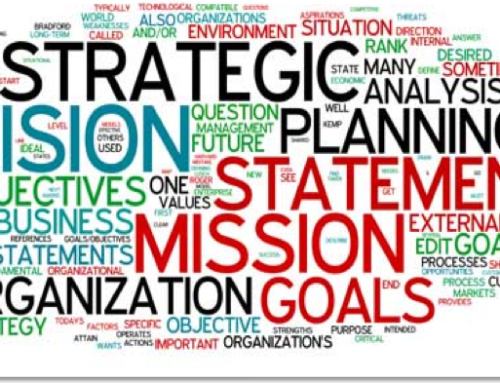Guest Post by Erin Feldman
I don’t have a background in public relations, but my current position as the marketing communications manager at TouchSystems requires some PR skills.
One of the primary aims of my position is to increase the company’s brand recognition and presence. One of the ways I’m doing that is through press releases about new products, changes to existing products, or developments at the company itself.
Doing so is a challenge; I’ve been having to remember and relearn the process for writing a press release while adding my own spin to it.
I’ve also been having to develop and grow my press distribution list.
The second task actually hasn’t been too difficult. I have some experience with public relations through some positions I’ve held in the past.
What I remember from those past experiences is how important it was to build a personal list.
Those memories have only been strengthened during the past few years as I’ve sought writing projects or guest posts. The projects and posts I’ve “won” have been the result of building a personal connection with my contact and understanding the needs of that person.
The process is a little different with PR since I’m trying to share information, but I think the same principles apply. If I expect anyone to listen to me, I have to listen to them first. It’s common courtesy and decency.
I also haven’t been emailing everybody and anybody.
I first researched potential contacts. I then contacted those people on an individual basis and introduced myself. I told those people I would be sharing information with them on a regular basis and, if they didn’t want to receive that information, that they should tell me so that I could respect their wishes.
In addition, I asked if they would like me to contact someone else in their department or on their team.
Finally, I added my personal touch. I said that I understood how quickly the inbox fills (I do.) and that I didn’t want to add to the clutter.
Once I built my initial list, I started to send information.
I avoided and still avoid using the words “press release” in my communications; I might as well mark my email as “spam” if I’m going to use those two words. I instead write a more descriptive and keyword-heavy subject line.
I then provide a short synopsis of the information I’m sending, but I provide it in a style that’s all my own.
I want my contacts to know that I took the time to craft a personalized message.
I want them to know why I’m excited about the information I share.
I also want them to know that I respect and care for them, which is why I always begin or end with a short sentence saying that I hope they are well.
I know the importance of simple friendliness as someone who receives it and tries to give it.
Is my method the best one? Probably not. I’m fairly certain it breaks some, if not all, the PR rules known to PR professionals.
It works, though, and I think the secret ingredient is this: I’m always myself. Everything I write contains some element of my personality, and people respond to it for good or ill.
Image: planeta via Flickr, CC 2.0
What do you do to build your press distribution list? Do you have any suggestions for me, the novice in the PR world?

![[EVENT]: PR Hacks for Small Biz (online)](https://shonaliburke.com/wp-content/uploads/2021/06/FB-Ad-1200x800-01-01-01-Copy-500x383.jpeg)








I normally just send it to @ginidietrich who has Jack Bauer create the pitch and work up a list for me. He works for milk bones.
It is funny I see so many blanket broadcast pitches people get that are so not the way to go. I like your steps and this will help me since I do some of this as a marketer. Thanks!
@HowieSPM @ginidietrich Eek! I’m a terrible person. This is the first chance I’ve had to respond to comments.
Who wouldn’t want Jack Bauer to create the pitch? He’s irresistible, especially when it’s his birthday. :)
You’re welcome! Glad it could help.
Oh, I was supposed to go to a place called the Flying Saucer last night, but my car decided to have a tizzy fit and blow a tire. Could I have expected to see you there? I suppose there are many flying saucers out there…
Good step by step process Erin.
Finding PR leads is one of those things I find to be a bit neglected in school. Building relationships is the name of the game in PR, but there is so little time really focused on that.
You can push a release to the wires and get a short SEO bump… maybe a few eyes will see your link… but that’s as a far as it goes. To get real PR, the old-fashioned stuff that still holds true no matter what method you are using, you have to communicate with people the right way.
Maybe interpersonal should be a required minor for PR students.
What I have been trying to figure out lately is where to find more journalists so I can actually meet them and learn how I can help them place good stories. A reporter friend recommended the Society of Professional Journalists, but they don’t meet too frequently in Houston it seems. Has that kind of networking helped you at all? Have you found any organizations of journalists that meet regularly and are pretty welcoming?
@Daniel J. Cohen Thanks, Daniel!
I agree, which is why I hope when I start to get speaking engagements that I might get to speak with PR classes on the college level. I know I’m from the writing and marketing background, but I would love to have the opportunity to talk about the right way and the wrong way to approach people.
I can’t really speak to the networking thing. I’ve barely started to scratch the surface in Austin, but I seem to be doing well so far. People are interested in who you are and what else you do outside your day job. You’re almost the odd person out if you don’t have a side business or other interests outside the daily grind. It’s a refreshing change. I know Houston has a Texas Young Professionals group. Austin has one, too, and I’ll be visiting with them this upcoming Thursday. If memory serves me correctly, Houston has an upcoming event soon, but it might have been this week. :-/ I’ve also learned of a social media club through going to, of all places, a Chamber event (I’m skeptical of Chamber events after my experiences in El Paso, but Austin seems to be entirely different.). I made three good connections at the event and have had the opportunity to meet with those people one-on-one or have plans to do so. You could always come to Austin and tag-a-long to some of the events I’m attending. ;)
@Daniel J. Cohen Sorry for the novella. That’s what my mom calls them anyway.
@Erin F. No apologies necessary! I love a good book and that was incredibly helpful.
I will see if HPA has meetings coming up and I would take you up on your Austin offer… if only I could get a weekend (that’s on those things where you have 2 days off in a row, right?)! Things are moving along in Houston as far as networking events go. The journalists are the ones we all want to meet I think. That may be why they’re so hard to find. :p
@Daniel J. Cohen Ha! Probably so. I know I’d be somewhat clandestine if I knew everyone was looking for me (I’d have too much fun doing so. I read too many Nancy Drew books when I was a kid.). Most of the networking events I find are through LinkedIn. I know I saw one that related more to journalists several weeks ago, but I had a scheduling conflict.
Weekends aren’t usually mine, either. I spend a lot of the time working on the Write Right business. We both should decide to take off two days and be unproductive. If we’re ever in each other’s neighborhoods, we’ll have to get together.
Excellent observations, Erin. I, like yourself, don’t have background in PR (also marketing) but I’m very passionate about that industry and I see common mistakes inexperienced PR make. Some PR practitioners try to go easy way by buying databases of media members and sending press releases with the “spray and pray” rule in mind. It has been perfectly described here http://www.longtail.com/the_long_tail/2007/10/sorry-pr-people.html or here: http://blog.journalistics.com/2009/can-spam-and-pr-pitches/ where the author is actual journalist himself.
I’ve noticed a common pattern of mistakes made by PR (which make Media pros’ work much much harder), and I decided to build Evoque – a collaboration platform for PR and Media pros, in the same time empowering them with tools to control quality of information (blocking PR spammers, warnings etc.)
I would really appreciate Erin (or any of you involved in PR and Media industry) if you agreed to test my web application which will be launched next month.
Once again, I would like to thank you for sharing that info with us.
@evoque You’re welcome.
I’m probably not the right person to be testing your application – my primary role is as a writing coach – but I’m certain you’ll be able to find people to evaluate your product if you remain active on other people’s blogs and let them get to know you and what you do.
@Erin F. Thank you Erin. I will do what you suggested. Have a nice day!
@evoque Thanks! I hope you had a good day. Mine was busy with things I’d have preferred not to do – taking care of my car was one of them. :-|
Good post, Erin. Contrary to ‘popular’ belief, your method is right on! Many think they just need to pull a a list from a media database (disclosure: I work for BurrellesLuce) but in reality, that’s just the starting point. Reading what that person has recently written and understanding that person’s needs is the REAL starting point to begin and foster a relationship. :)
@tressalynne Thanks! Maybe it’s a good thing I didn’t study PR? I didn’t have very many bad habits that needed to be broken. :) I think most of what I’ve learned has been through experience or listening to people like you.
@Erin F. Yeah, the shotgun approach is becoming more and more obsolete.
@tressalynne Thank goodness!
Hi Erin —
I’ve been working in public relations for a long time, and I think your approach is right on track! In addition to strengthening your professional relationships, your goal is for these target journalists to see you as a knowledgeable, responsive source of topical information. In that vein, consider sending members of your list occasional story tips or ideas that you know will be relevant to their beat, but don’t involve your client. That will help you start an ongoing dialogue and may open additional opportunities to cross-pitch down the road.
Great blog post!
Annie
@anniealleybc Phew! I was afraid I might be missing the mark with my strategy. :)
Thanks for the tip, too. It’s a great idea.
I think being personal is so important. Crafting a personal message that speaks to each person you’re reaching out to makes them more inclined to read it. Also, like you said, once you’ve been on the other side of the fence you are much more understanding when you become the person who’s being reached out to (or at least you should) but you also become more picky about how it’s done. For me it has to be personal, if it is I will read it, it’s that simple.
@rachaelseda I have become pickier about what pitches I’ll read. It’s also made me recognize my own failings when I used to send pitches of any sort, such as cover letters for job applications. I’ve come to believe in the power of specificity – probably due in no small part to my academic background – over generalities. :)